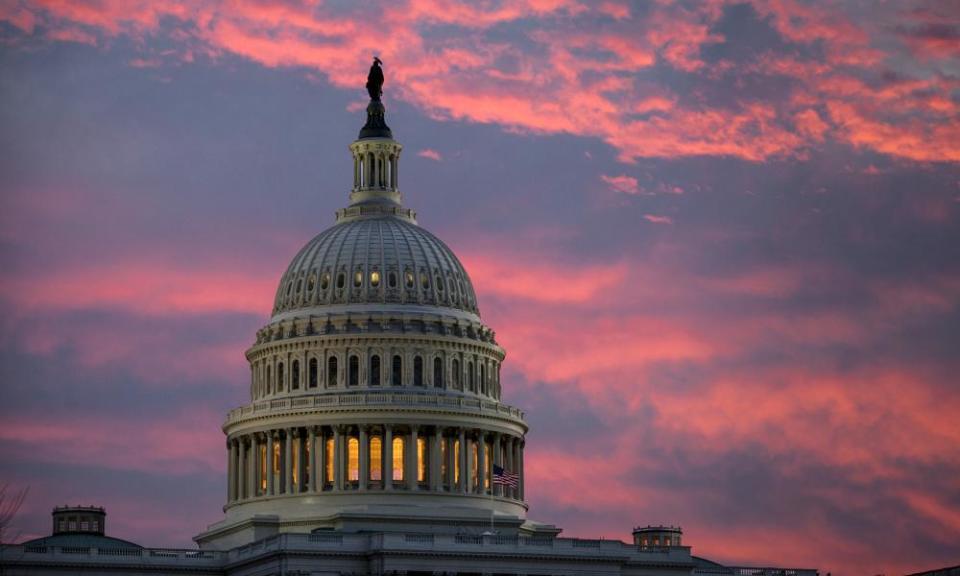The Republican tax bill: four takeaways | Corey Robin
The Republicans are already pivoting from tax cuts to the debt, claiming that the next task is to rein in spending. The left should say: not so fast

Taxes are the “thunder of world history,” wrote Joseph Schumpeter. “The spirit of a people … is written in its fiscal history.”
Last Saturday, Republicans in the US Senate joined their comrades in the House to write a new chapter in America’s fiscal history.
Or did they?
1. This bill is a Republican dream come true
Critics of the tax cuts – on the left and the right – see it as a break with the conservative past, a sign that today’s Republican party has been captured by mad dogs and rubes.
But look at these names all signing a group letter in favor of the Republican tax cuts: Robert Barro, Michael Boskin, Douglas Holtz-Eakin, Glenn Hubbard, Lawrence Lindsey, George Schultz, and others. It’s a who’s who of the Nixon, Reagan, Bush and Bush administrations – larded and laced with Harvard, Princeton, Columbia, and Stanford.
One of the Republicans’ most notorious cuts – reducing or eliminating inheritance taxes on the rich – elicited this defense from Republican senator Charles Grassley of Iowa:
I think not having the estate tax recognizes the people that are investing, as opposed to those that are just spending every darn penny they have, whether it’s on booze or women or movies.
It sounds crude, just the sort of impolitic thing today’s rabid Republican – as opposed to yesterday’s genteel conservative – would say.
Till you remember that it was libertarian guru Ludwig von Mises (that “von” was there for a reason) who told Ayn Rand, inspiration to Paul Ryan and other conservatives:
You have the courage to tell the masses what no politician told them: you are inferior and all the improvements in your conditions which you simply take for granted you owe to the effort of men who are better than you.
2. Powerful lobbies weren’t able to stop it
If there’s a silver lining in the Republican victory on taxes, it’s this: this is a bill that passed over and against the opposition of some powerful lobbies.
As Matt Yglesias writes, the working assumption of the healthcare bill Barack Obama and the Democrats passed in 2010 was that you couldn’t get legislation through Congress without the buy-in of major lobbies.
Maybe that’s no longer the case?
3. It puts deficit hawks in a tough spot
For the last 40 years, Republicans – and their Democratic enablers – have managed to stop government spending by screaming debt, deficit, and debt. But as David Dayen points out, the tax bill may have taken that weapon away from them.
The bill combines $6tn in tax cuts, mostly to the rich, and $4.5tn in tax increases. Hence, the overall cut of $1.5tn. The cuts are deeply unpopular. When the left starts pushing for good things like single-payer or free college, it’ll have a great argument for how to pay for them: undo most of the Republican tax cuts.
Conversely, some of the Republican tax increases – reducing deductions on home mortgages, for example – are good. Most of those deductions go to the upper middle class. For a long time, they were considered politically untouchable. But the Republicans have shown they’re not. And there’s no reason to undo them. That’s more revenue for social spending.
4. It poses a risk – and an opportunity – for Democrats
As incoherent as the Republican party is, when it comes to taxes, they’re a party, willing to use their smaller grip on power (relative to Obama and the Democrats in 2010) to pursue their maximalist plans. I’m not convinced it’s not going to blow up in their face. Even so, there may be a lesson here for how a party can get things done.
A big risk for the left is if it responds to these cuts by screaming about the debt. If Democrats do that, we’re finished.
If the left says, instead, reverse the cuts, keep some of the increases, and use that money for health care, free college, public transportation, and jobs, we’ve got a new politics, one that breaks with the austerity that Democrats from Carter to Obama have peddled.
The Republicans are already pivoting from tax cuts to the debt, claiming that the next task is to rein in spending. The task of the left is to say: not so fast. The Republicans have shown us the money is there. It should be spent, not on the debt but on pressing social needs.
Corey Robin is the author of The Reactionary Mind: Conservatism from Edmund Burke to Donald Trump

